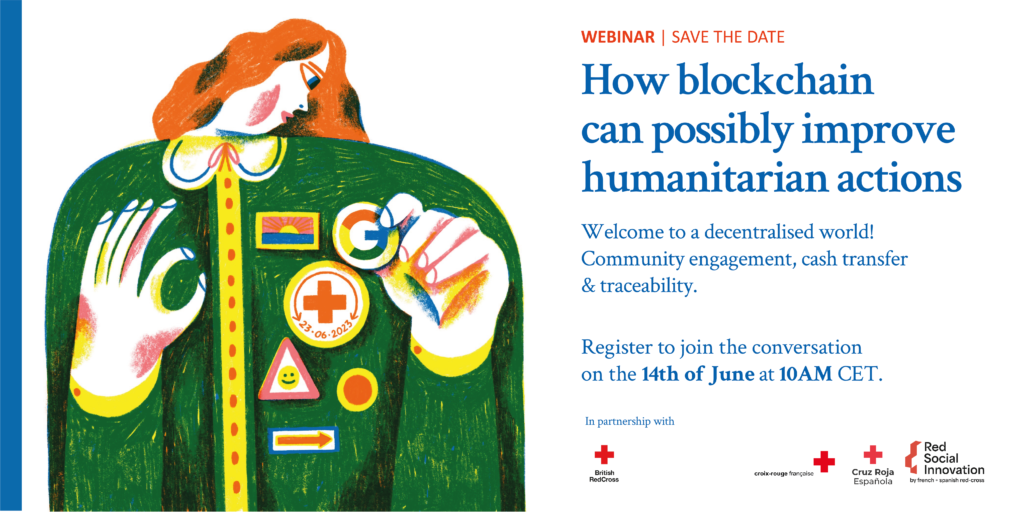
Since the creation of the Bitcoin by Satoshi Nakamoto in 2008, the extraordinary opportunities linked to crypto and blockchain technology are taking off in many sectors. Nowadays, forecasts suggest that spending on blockchain solutions will continue to grow in the coming years, reaching almost 19 billion U.S. dollars by 2024 (Statista, 2022).
Due to its cryptography and immutability features, Blockchain applications promise the improvement in efficiency, transparency and accountability of humanitarian operations. However, all implications need to be taken into consideration when we talk about the implementation of new technologies in a field as volatile, complex and multi-sectoral as the humanitarian sector. We acknowledge the existent challenges concerning blockchain’s blurry legal framework and the compelling need to further advance the understanding of this subject.
Identifying that blockchain technologies are a future research direction that urges to raise the dialogue among humanitarian actors, Red Social Innovation is launching a publication on “How blockchain can possibly improve humanitarian actions”. Co-produced with the British Red Cross, this report gathered experts and case studies around the subject as means to explore the usages of blockchain related to community engagement, cash transfer & traceability.
Crypto Donations & Transparency
Cryptodonations have recently become an appealing subject concerning all international organisations. Based on the experience of the British Red Cross, Celia Scruby who is part of the Fundraising Innovation team, shares about her past experience in terms of crypto donations, and acknowledges the challenges faced by different organisations concerning their legal frameworks and due diligence. She emphasises on the importance of taking into consideration the risks related to the volatility of the market, the policies and procedures regarding refunds, anonymous donations, and more.
Blockchain technology can be very helpful in the aid sector to establish a clear traceability of cross-border cash transfers or sensitive information. This is why we consulted Hoummand Haddad’s perspective as Head of Emerging Technologies at the United Nations World Food Program (WFP), with respect to the project ‘Building Blocks’. This project aims to overcome the existing political barriers, by offering a common and neutral system designed for the humanitarian sector. He elaborates on the unsolved challenges such as, connectivity, digital illiteracy, lack of access to devices/infrastructure and particularly, the importance of not imposing these new technologies in marginalised communities that can possibly absorb the risks.
Security & Data
As a highly secured and distributed database that contains the history of all exchanges made since its creation, blockchain allows its various users to check the validity of the chain, without intermediaries. This leads to efficient transactions diminishing the need for a centralised network or a private system, prioritising higher security and transparency (Hunt, 2022). In order to better understand the challenges blockchain poses when we talk about security and data management, Vincent Graf Narbel, who is Head of the TechHub at the ICRC Data Protection Office, shared his thoughts about data management, funds traceability and accountability. Raising important questions touching upon the maturity of the technology, specially in a moment where legal frameworks are unclear and constantly changing from one country to another.
Environment & Sustainability
According to The Cambridge Bitcoin Electricity Consumption Index (CBECI) the bitcoin network power demand –which is one of the uses of blockchain technology– is estimated to be 16.60 GW per year. To better understand the amount of energy, this would be the equivalent to the maximum amount of power that could be produced by about 20 large nuclear power plants (WNO, 2023). This is due to the mining process implemented by some cryptocurrency proof-of-work process.
Even Though some crypto have managed to reduce their energy consumption by transitioning to a different mining procedure, the environmental impact related to this technology is very high, both in terms of electricity consumption and electronic waste.
45 minutes
On June 14th at 10am CET, Red Social Innovation and the British Red Cross are organising a 45 minutes webinar on the following subject: How blockchain can possibly improve humanitarian actions. Over the course of this discussion, you will hear Vincent Graf Narbel, who is the Head of the TechHub at the ICRC Data Protection Office, talk about Partisia, a blockchain technology which focuses on a protection and privacy preserving design for CVA use.
You will then listen to Celia Scruby, who works in the Fundraising Innovation team at British Red Cross, and is leading the initiative to explore accepting donations in crypto currency.
Right after we will connect with Hoummand Haddad, who is Head of Emerging Technologies at the United Nations World Food Program (WFP), to talk about the project ‘Building Blocks’.
And last but not least, we will finish with the testimony of Balt Leenman, about the WhiteFlag protocol, a messaging platform that notifies vulnerable parties of impending conflict before it happens to prevent the loss of life.


